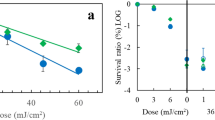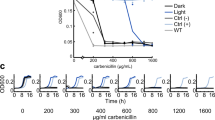Abstract
IN a previous paper1 it was shown that dwarf-growth mutants in Bacterium prodigiosum (Serratia marcescens) can be produced by ultra-violet radiation apparently in a one-hit mechanism, and that the most active wave-lengths lie below 3,000 A. If the killing of bacteria by a light-quantum hit is a process happening in the genetical system, one might suppose that also the energy of quanta of visible light may be capable of producing vital genetic variants, for Liechti et al.2 had observed the killing of vitalstained bacteria by such longer wave-lengths.
This is a preview of subscription content, access via your institution
Access options
Subscribe to this journal
Receive 51 print issues and online access
$199.00 per year
only $3.90 per issue
Buy this article
- Purchase on Springer Link
- Instant access to full article PDF
Prices may be subject to local taxes which are calculated during checkout
Similar content being viewed by others
References
Kaplan, R. W., Z. Nat. Forsch., 3, b, 29 (1948).
Liechti, Feistmann and Gugenheim, Strahlenther., 64 (2), 353 (1939).
Demerec and Latarjet, Cold Spring Harbor Symposium, 11, 38 (1947).
Author information
Authors and Affiliations
Rights and permissions
About this article
Cite this article
KAPLAN, R. Mutations by Photodynamic Action in Bacterium prodigiosum. Nature 163, 573–574 (1949). https://doi.org/10.1038/163573b0
Issue Date:
DOI: https://doi.org/10.1038/163573b0
This article is cited by
-
Appreciation of the value of different bacterial test systems for detecting and for ranking chemical mutagens
Archives of Toxicology (1980)
-
The lack of proportionality between mutation rate and ultraviolet dose in Drosophila
Heredity (1954)
-
Mutationsforschung an Bakterien
Die Naturwissenschaften (1950)
-
Ausl�sung von Phagenresistenzmutationen bei Bacterium coli durch Erythrosin mit und ohne Belichtung
Die Naturwissenschaften (1950)
Comments
By submitting a comment you agree to abide by our Terms and Community Guidelines. If you find something abusive or that does not comply with our terms or guidelines please flag it as inappropriate.



